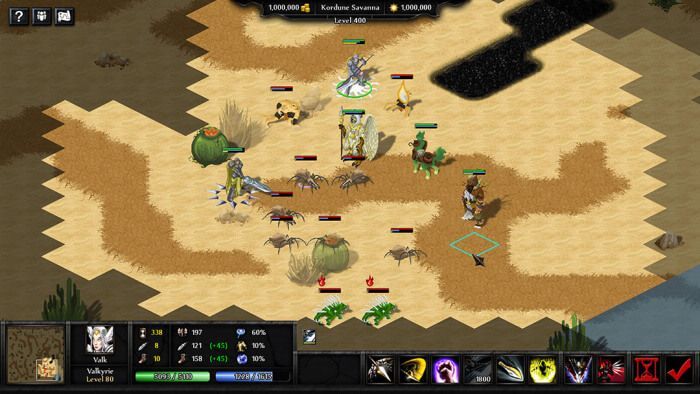
Immortal Empire Review
By Rob Gordon 26 November 2015
Immortal Empire lacks polish and suffers from simplistic gameplay, but in spite of its shortcomings there is something addictive about this free-to-play strategy game.
In recent years, free-to-play games have become a major part of the video game industry. In the mobile circuit, companies such as King have reached huge success, with the Candy Crush developer eventually being bought out by Activision for $5.9 billion. Meanwhile, potentially the biggest PC game in the world is free-to-play, with League of Legends even selling out stadiums for professional gaming tournaments.
With developers such as Riot Games proving that freemium play does not necessarily mean a game needs to drop to the same level of quality of Farmville, it’s no surprise to see other studios try to emulate prior successes. One of these titles is Immortal Empire, a strategy game from Tactic Studios. Initially starting as a browser-based game, it has now made its way onto Steam.
Immortal Empire revolves around the fantasy world of Alvedor, which is on the brink of collapse. An event known as ‘The Sundering’ has made drastic changes to the world’s landscape, destroying many realms and causing creatures to transform into violent, tainted beasts. Enter the player, as the world’s sole chance for salvation.

That said, the player is actually more of a side-character, in a way. Awakening with no memory of their past, the player character finds that they are an Immortal – a fantastical being with tremendous strength, but tied to the life of an “elder” who helped create it. The player’s character was found on the brink of death, and resurrected as one of these eternal champions by a mysterious man trying to save the world.
Although the player character – chosen from a number of different Immortal beings including the likes of Paladin and Priestess at the beginning of the game– is still the hero of the story, the context of the situation almost paints the player as some kind of overpowered fantasy-based Pokemon. They are then thrown in to different missions, in an attempt to save innocents from the dangerous magicks that threaten the land.
Immortal Empire certainly wears its influences on its sleeve. The isometric viewpoint and turn-based combat have heavy lashings of the original Fallout games. The player can eventually grow a squad of five Immortals, which married with the fantasy setting makes the game feel akin to the likes of Baldur’s Gate – albeit in more of a tactical setting.
The gameplay, however, feels most similar to the Spiderweb Software-created PC RPGs, such as the Avernum series of Avadon: The Black Fortress. Movement around the map outside of combat is stilted but generally fast-paced, whilst the wait between combat turns is thankfully quick. Maps are normally small, consisting of pockets of enemies to defeat with overall missions to complete.

Given the epic scale of the game’s story and setting, missions themselves are surprisingly brief. There is no real open world to traverse, or pockets of calm between battles. Instead, the player hops from location to location, interspersed with moments of dialogue that pushes the plot forward.
The plot itself was never likely to be a particularly strong reason for players to pick up the game, however. Instead, players may be drawn to Immortal Empire’s little bursts of simplistic strategic fun, with easy to understand tactics and levelling system. The game is unlikely to provide much challenge, but in spite of its basic gameplay, there is something very moreish about playing a quick level or three.
The lack of gameplay polish also continues into the game’s graphical style and sound design. Overall, Immortal Empire looks fairly cheap, with awkward character models and basic talking heads in moments of dialogue. Although some of the Immortals have strong artwork in place in the character select screens, it also does not transpose well into the tactical arenas.

When looking at the variety of different Immortals, the game’s free-to-play nature rears its ugly head for the first time. Playing the free version of Immortal Empire grants the player a choice of five different Immortals at launch, covering basic fantasy placeholders like the aforementioned Paladin and the Druid, whilst eight more characters require additional purchases. If a user wants to play as some of the more interesting designs and characters, such as the Phoenix Mage or Banewitch, they will have to pay extra.
This can cost in terms of real-life money, or through the in-game currency of Radiance. Thankfully, Radiance is hardly a rare commodity. It can be found by completing a number of challenges, and Immortal Empire does not limit the player’s chances of accumulating the currency. If the player is patient enough, there is no need to spend anything on Immortal Empire at all.
With regards to character choice, Immortal Empire toes the fair line of free-to-play business. Players sounding the game out will find all game modes available at launch, but simply with a limited number of characters to choose from. Those wanting to play the game with a different character, or who feel that the game is worth financial investment, are free to purchase these additional Immortals.

Radiance also has other purposes, and this is where Immortal Empire’s freemium model becomes a little problematic. The currency can also be used for character buffs, as well as items and skill rerolls. Although this makes little difference to the single player mode of the game, it has huge ramifications for player enjoyment in multiplayer.
Unfortunately, there’s the possibility that the PvP elements of Immortal Empire could rely heavily on pay-to-win, with those most willing to spend large lump sums to upskill their character easily steamrolling other players. Players could be best served keeping to the game’s campaign, or taking part in the co-op Gauntlet mode, both of which work without need for Radiance. In fact, a cooperative gameplay experience is one of the areas where Immortal Empire shines.
The quest to save Alvedor involves drop-in multiplayer, with other players able to join someone’s campaign to assist with individual missions. It’s a neat touch, and allows an easy way for struggling players to continue with the plot. Often, other players can reach out using the game’s chat bar for help with a specific quest, with other uses more than willing to lend a hand.
The long-lasting success of Immortal Empire will perhaps come down to whether this sense of community manages to continue, as there’s certainly something here for players to enjoy. The game is very rough around the edges, and the gameplay may not offer the level of depth many strategy fans may yearn for, but Immortal Empire is a fun title for those with a bit of time to spare. The game is not for everyone, but those enticed by no initial cost may find something worth sticking around for.
Trailer
Immortal Empire is out now for PC. Game Rant was provided with a Steam code for this review.
